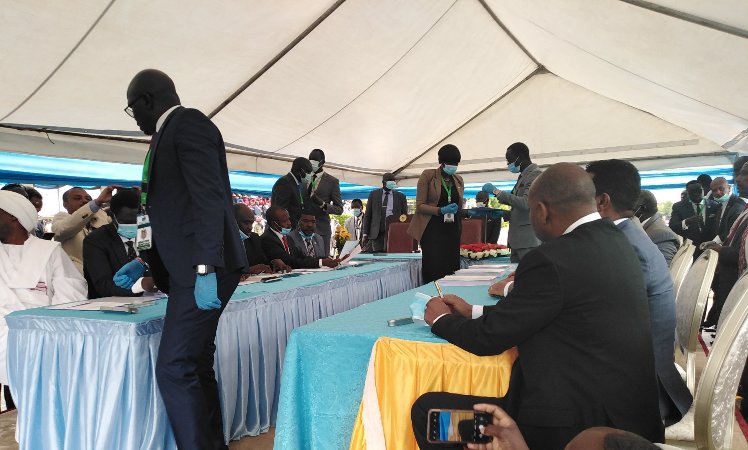Sudan’s peace groups say lack of political will behind delay of security arrangements

While the army repeated that the operation needs 187 million dollars they do not have for the time being.
In line with the JPA implementation matrix, the implementation of the security arrangements should be achieved within two months from the date of signing on October 3, 2020.
The Article Training Center in Khartoum held a symposium on “The Impact of the Slow Implementation of the Security Arrangements on Peace in Sudan” with the participation of Lt Gen Khalid al-Shami, army negotiator of the security arrangements, Yasir Arman, deputy head of the SPLM-N and head of its negotiating delegation, Jabir Mohamed Hassaballah, security advisor to SLM Minni Minnawi and Suleiman Sandal, a leading member of Justice and Equality Movement.
Hassaballah held the government responsible for delaying the implementation of the security arrangements and accused political forces participating in the transitional government of working to hamper harmony between the government’s components.
He warned that delaying the implementation of security arrangements would lead to security chaos in the war zones and the capital.
JEM Suleiman Sandal said the slow implementation of the security arrangements was “intentional”, adding that the “old mentality in the army complicates the (process) by creating new movements.”
He further said the delay in implementation is due to political considerations, not to the lack of financial resources.
In the same vein, Arman said that the army wants only to integrate the fighters of the former rebel groups while the peace agreement provides to carry out radical reforms in the Sudanese army to establish a new national army built on new bases.
“There is a desire to preserve the old army, and to create regional alliances, but both approaches are unacceptable.”
Arman stressed that the delay in implementing the security arrangements was not caused by the lack of money, but rather by the “lack of political will.”
He warned against a new conflict in the country, saying that “a single shot could explode the country because it is lying on a powder keg.”
Also, Arman spoke about a problem between the army and the Rapid Support Forces without details, before calling to avoid fighting between the two sides. He further stressed that building a single army is imperative to end the two separate commands.
The two sides have increased the combat readiness of troops at 100% readings since last week, while newspapers purported tensions between the leaders of the two parties.
However, the army and the RSF denied the existence of tensions On Friday.
Response of Sudanese army
On the other hand, General al-Shami stressed that the delay in the implementation of the security arrangements was due to the lack of financial resources.
He said that the implementation process requires $187 million to feed combatants and other commodities so that they can turn into professional soldiers.
He said that the Sudanese army, contrary to what is said, is a comprehensive army that represents all the people of Sudan.
He added that the armed groups also contributed to the slow pace of the implementation process, pointing out that they noted 20 violations committed by the groups, including the delay in submitting their forces’ lists.
However, the army did not inform the South Sudanese mediation of these violations, he further said.
The military official underscored that there is a committee tasked with the collection of money for the implementation of the security arrangements process chaired by the Minister of Finance and the leader of the Justice and Equality Movement, Gibril Ibrahim.
In an interview with the Sudan Tribune last May, Ibrahim acknowledged the existence of obstacles facing the provision of money for the peace implementation process, especially the security arrangements.
“We were unable to provide the resources required to implement the peace agreement because the country is in a state of scarcity and the World closure due to the COVID-19 pandemic, which impeded the holding of a donors’ conference that was agreed in the peace agreement.”
(ST)
